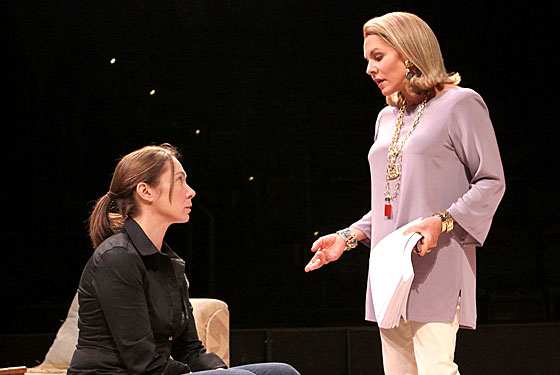
Polarized families, re-litigating America’s ideological and political past: This is something I’ve seen a lot of this theater season, and I can’t say I’ve enjoyed much of it, despite a personal predilection for well-built social drama. Then along comes Other Desert Cities, a new work by the lively, big-brained pop-moralist Jon Robin Baitz (The Substance of Fire, A Fair Country), that’s engaged in passionate debate with itself — and quicker than you can say “All My Sons” I’m hooked again.
The plot is simplicity itself, a classic you-can’t-go-home-again-yet-here-you-are-home-again. Crunchy, oft-blocked, “vaguely suicidal” novelist Brooke (Elizabeth Marvel) has written a memoir about her Hollywood Republican parents: father Lyman (Stacey Keach), a Reaganesque B-movie actor with a sub-Reaganesque post-showbiz low-grade political career; and mother Polly (Stockard Channing), a hyperassimilated Jew (or “Texan,” as she prefers to think of it) who, in her heyday, wrote a hit series of Gidget-esque fluff pictures and palled around with Nancy and Ronnie. Brooke’s book zooms in on her parents’ politics and their callous treatment of her older brother Henry, a leftist radical who died nearly three decades before. Engaging in more than a little overt projection, Brooke blames mom and dad for pushing Henry to suicide by shunning him when he needed them most: It was the awful day when a bomb went off and his involvement with a murderous Weather Underground-style terror-outfit came to light.
For a second, it looks like we’re in for American Pastoral: West Coast Edition. But Baitz, a devout humanist with an incurable optimism that tends to infect even his doomiest characters, isn’t interested in that brand of despondency. And Polly Wyeth is no wide-eyed Swede, no innocent victim of history. “I don’t like weakness,” she admits, later adding: “I hate being fair.” And: “Living on the east coast has given you the impression that sarcasm is alluring and charming. It is not. Sarcasm is the purview of teenagers and homosexuals.” She says this, and it is Law. Polly’s a holy terror, and Channing pulls no punches, especially once she’s been on her feet a while and works the play’s energy into her muscles. Her sparring scenes with her newly sober, live-in sister Silda (a judiciously and brilliantly deployed Linda Lavin), her one-time writing partner and ideological opposite-number, confirm Baitz’s rep as a master of crackling dialogue.
But this isn’t a two-person crossfire. Luckily: It’d be a grind if it were. Along with Lavin’s Silda, Brooke’s militantly nonideological reality-TV producer younger brother Trip (a superb Thomas Sadoski) mediates the discussion and gives us a much-needed break from his sister’s grim, often misguided journey to self-created catharsis. (Baitz, a TV vet himself and the creator of Brothers and Sisters, has invested a lot of sympathy in this character, and it pays off. Though he might’ve spared a little more of it for Brooke, who, despite Marvel’s ministrations, can’t help but be a bit of a drag.)
Naturally, there’s a deep, dark family secret at the heart of the show, which gives it its raison d’etre, but also its chief liability: A little too much is mortgaged on the final revelation, which raises more questions than it answers about the Wyeths’s complex family dynamic. And one could raise the usual, ungenerous hill-of-beans questions regarding the dramatic worth of these lives and their troubles — the dilemmas of very rich, very slick showbiz pashas and their fashionably troubled, overeducated spawn. But through it all, Baitz manages to engage matters of public and private morality — and public and private ideology — with wit and energy, and a minimum of self-flagellation. One wonders (shudders?) at what the next election cycle will inspire in him.




